The Patanjali business model revolves around offering affordable yet high-quality products to consumers. Unlike other players in the market, Patanjali focuses on leveraging the benefits of Ayurveda, an ancient Indian system of medicine, to provide natural and healthy alternatives. The company’s product portfolio spans a wide range of categories, including personal care, home care, food and beverages, natural remedies, and more.
Established in 2006 by Baba Ramdev and Acharya Balkrishna, Patanjali, an Indian consumer goods company, has revolutionized the traditional FMCG industry in the country. With a focus on promoting Ayurvedic products and organic food, Patanjali has gained a loyal customer base and disrupted the market dominated by multinational corporations.
One of the key aspects of the Patanjali business model is its direct distribution strategy. Instead of relying on middlemen and distributors, Patanjali sells its products directly to consumers through its vast network of retail stores, known as Patanjali Chikitsalayas and Divya Pharmacy outlets. This approach eliminates the need for intermediaries and helps the company maintain control over pricing and quality.
Furthermore, Patanjali’s business model extends beyond traditional retail outlets. The company has also embraced the e-commerce space, allowing customers to purchase its products online through its website and various third-party online marketplaces. This digital presence has enabled Patanjali to reach a wider customer base and tap into the growing trend of online shopping.
Another notable aspect of the Patanjali business model is its emphasis on promoting swadeshi (indigenous) products. Patanjali strongly believes in supporting local farmers and manufacturers, sourcing raw materials locally whenever possible. By doing so, the company contributes to the development of the Indian economy and fosters a sense of national pride among its customers.
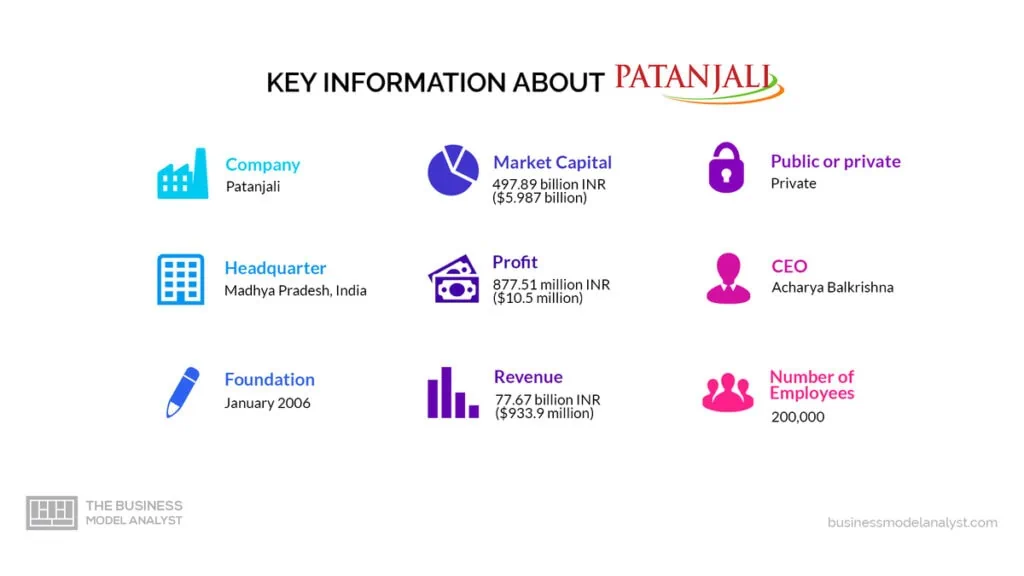
Contents
A brief history of Patanjali
Patanjali, a renowned Indian consumer goods company, has a history that traces back to the efforts of Acharya Balkrishna and Swami Ramdev. The journey began as a small venture with a vision to provide the masses with high-quality herbal and natural products.
In the early 2000s, Acharya Balkrishna, a close associate of Swami Ramdev, recognized the need for Ayurvedic products that were not readily available in the market. Intending to promote the ancient Indian science of Ayurveda, they decided to establish Patanjali Ayurved Limited. The company was named after the prominent sage, Maharishi Patanjali, known for his contributions to Ayurvedic medicine.
Initially, Patanjali focused on manufacturing Ayurvedic medicines and herbal supplements. Their products gained popularity due to their natural ingredients and affordable pricing. This success encouraged the founders to expand their product range to include personal care, food items, and home care products.
Patanjali adopted a unique business model that combined traditional Ayurvedic practices with modern manufacturing techniques. They established their own manufacturing units and utilized extensive research and development to create high-quality products. This vertical integration allowed them to control the entire production process and maintain strict quality standards.
In addition, Patanjali emphasized the use of indigenous raw materials sourced from local farmers. This not only helped in promoting sustainable agriculture but also supported rural economies. The company actively engaged in various social initiatives, including promoting organic farming and improving farmers’ livelihoods.
With their commitment to providing affordable and natural products, Patanjali quickly gained a loyal customer base. Their success can be attributed to their disruptive marketing strategies, which included leveraging Swami Ramdev’s immense popularity as a yoga guru to endorse their products. This unique combination of yoga and Ayurveda resonated with consumers, and Patanjali’s sales soared.
As Patanjali continued to expand its footprint, it faced stiff competition from established multinational corporations in the consumer goods industry. However, the company remained focused on its mission of offering natural alternatives to consumers. They capitalized on the growing demand for organic and herbal products, successfully positioning themselves as a trusted brand in the market.
Over the years, Patanjali has witnessed remarkable growth. It has diversified its product portfolio, including offerings such as herbal cosmetics, nutritional supplements, dairy products, and even clothing. The company has also ventured into the e-commerce space to cater to a wider customer base.
Today, Patanjali stands as one of India’s leading consumer goods companies, with a strong presence both domestically and internationally. Its success can be attributed to its commitment to quality, affordability, and the revival of traditional Ayurvedic knowledge.
Who Owns Patanjali
Patanjali Ayurved, the renowned Indian company that specializes in Ayurvedic products, follows a unique ownership structure. The majority stake, approximately 98.6%, is owned by Acharya Balkrishna, a close aide of the company’s founder, Baba Ramdev. Acharya Balkrishna’s significant ownership stake in Patanjali has been instrumental in the company’s success and growth in recent years.
In 2023, Forbes ranked Acharya Balkrishna as the 68th richest Indian (852nd in the world), estimating his net worth to be around $3.2 billion. He was 19th in 2017 with a net worth of around $7.3 billion. His deep involvement in Patanjali’s operations and strategic decision-making is evident in the company’s steady expansion and brand recognition.
Interestingly, Baba Ramdev, the renowned Yoga guru and spiritual leader, does not directly own any shares in Patanjali Ayurved. While he is the face of the brand and plays a crucial role in promoting its products and values, his ownership in the company is not reflected in shareholding. Instead, Baba Ramdev has established himself as a key influencer, spokesperson, and visionary for Patanjali Ayurved, continuing to shape its mission and values.
On the other hand, Patanjali Foods Ltd, a subsidiary of Patanjali Ayurved, operates differently in terms of ownership. It is a publicly-traded company listed on the Indian National Stock Exchange (NSE). As a publicly traded entity, Patanjali Foods Ltd is owned by various institutional and individual shareholders, including retail investors who hold shares through brokerage accounts. Patanjali, nonetheless, still owns 40% of the subsidiary’s shares.
Patanjali Mission Statement
Patanjali’s mission statement is “making India an ideal place for the growth and development of Ayurveda and a prototype for the rest of the world.”
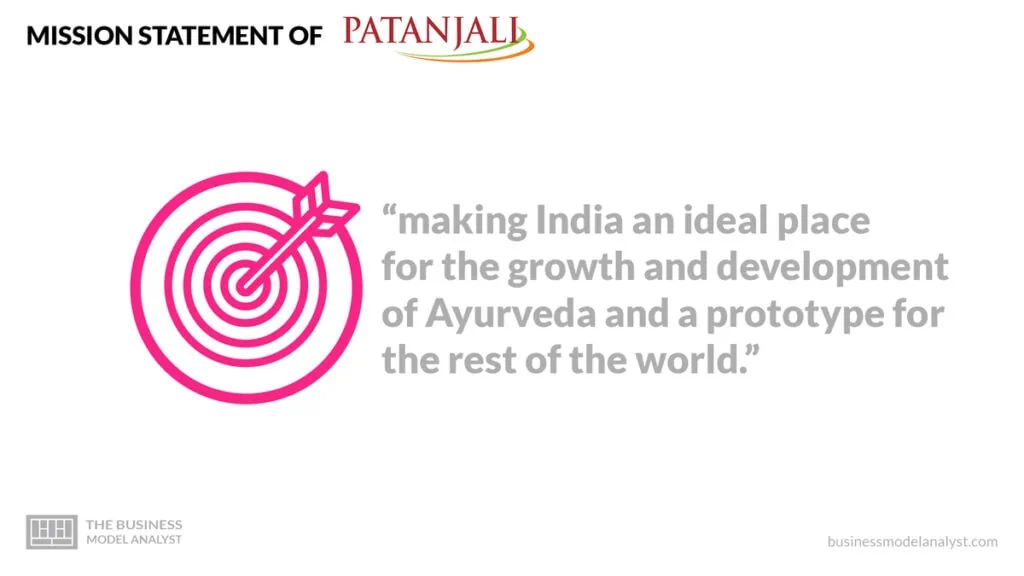
How Patanjali works
Patanjali’s business model revolves around offering a diverse portfolio of products that cater to various consumer needs. Their product range includes personal care items, food products, herbal medicines, cosmetics, home care products, and more. The company takes pride in producing all-natural and chemical-free goods, making them popular among health-conscious individuals.
To access Patanjali’s offerings, customers can visit their physical stores across India or purchase through their official website and mobile app. These platforms provide an easy-to-navigate interface, allowing customers to explore the extensive range of products available. Patanjali’s website and app leverage technology to provide a seamless user experience and offer personalized recommendations based on individual preferences and needs.
Once customers have selected their desired products, they can add them to their cart, specify quantities, and proceed to the checkout process. Patanjali offers various payment options, including cash on delivery, credit/debit card payments, net banking, and digital wallets, ensuring convenience and flexibility for customers.
Upon successfully completing the payment process, Patanjali ensures prompt and reliable delivery of the purchased products. They have built a robust supply chain network to facilitate the distribution process and reach customers promptly. The company prioritizes efficient logistics and works with third-party logistics partners to ensure the products are delivered securely and carefully.
In addition to its product offerings, Patanjali is committed to promoting its brand through various marketing strategies. They invest in advertising campaigns, sponsorships, and events to create brand awareness and engage with their target audience. Patanjali’s marketing efforts highlight their products’ natural and ayurvedic aspects, emphasizing their commitment to health and well-being.
Patanjali continuously invests in research and development to further enhance customer satisfaction to innovate and expand its product offerings. They collaborate with experts and scientific institutions to develop new formulas and improve existing products. This commitment to innovation enables Patanjali to cater to evolving consumer preferences and maintain its competitive edge in the market.
How Patanjali makes money
Patanjali, a well-known Indian consumer goods company, operates under a diverse business model to generate revenue. While the company mainly focuses on manufacturing and selling fast-moving consumer goods (FMCG) products, Patanjali also engages in various other activities to diversify its income streams. The following are the key ways through which Patanjali makes money:
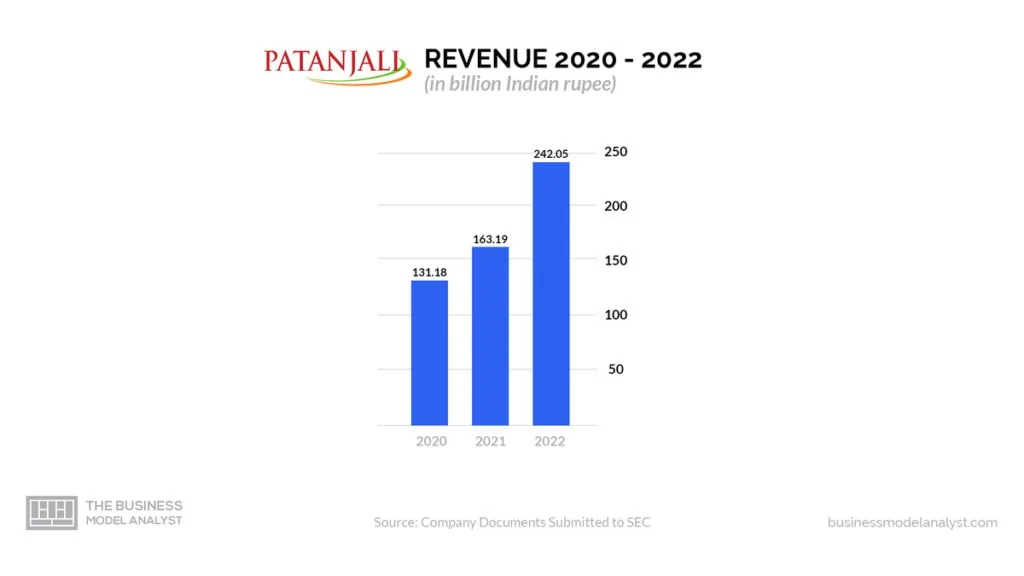
Sale of FMCG Products
One of Patanjali’s primary sources of revenue is the sale of FMCG products. The company produces a wide range of items including food and beverages, personal care products, and Ayurvedic medicines. These products are sold through various distribution channels, including Patanjali’s own retail stores, e-commerce platforms, and partnerships with other retail chains. Consumers purchase these products competitively, contributing significantly to Patanjali’s revenue.
Ayurvedic Medicines and Healthcare Services
As a company rooted in Ayurveda, Patanjali generates revenue by selling Ayurvedic medicines and healthcare services. Patanjali manufactures and markets a variety of herbal remedies and health supplements based on Ayurvedic principles. Additionally, the company operates Ayurvedic clinics and healthcare centers across India, offering consultations, treatments, and therapies based on traditional Ayurvedic practices. The income generated from these services adds to Patanjali’s overall revenue.
Yoga and Wellness Programs
Patanjali, named after the ancient sage Patanjali, who authored the Yoga Sutras, also generates money through yoga and wellness centers. The company offers yoga classes, training workshops, and retreats focusing on yoga, meditation, and overall well-being. These programs attract individuals seeking physical and mental health benefits and are an additional revenue source for Patanjali.
Partnership and Licensing Agreements
Patanjali collaborates with other businesses through partnership and licensing agreements to expand its product reach and generate revenue. The company licenses its brand name and intellectual property to entities manufacturing products in various segments. Patanjali earns royalties and fees from these partnerships, leveraging its brand reputation and popularity.
Export of Products
Patanjali has successfully expanded its reach beyond the domestic market by exporting its products worldwide. The company exports its FMCG products, Ayurvedic medicines, and other offerings to different countries, capitalizing on global demand for natural and Ayurvedic products. The revenue generated from international sales plays a crucial role in Patanjali’s overall financial performance.
Patanjali Business Model Canvas
The Patanjali Business Model can be explained in the following business model canvas:
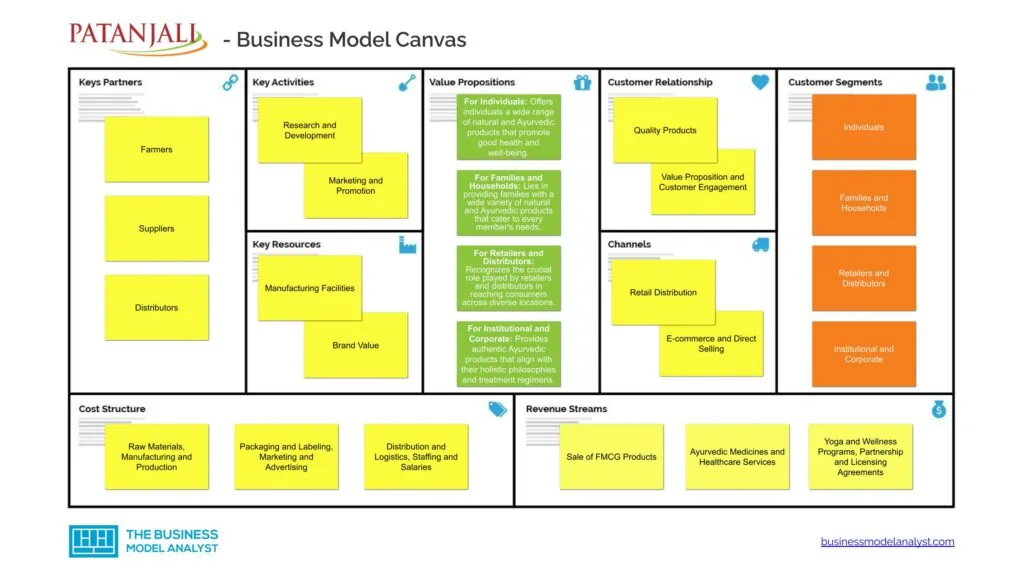
Patanjali Customer Segments
Patanjali has a diverse customer segment that encompasses various groups of individuals and organizations. The key customer segments of Patanjali can be classified as follows:
- Individuals:
- Health-conscious individuals: Patanjali’s products primarily cater to individuals who prioritize their health and well-being. These customers seek natural and Ayurvedic products as alternatives to synthetic or chemical-based items;
- Yoga enthusiasts: Patanjali’s close association with yoga and its founder Baba Ramdev attracts individuals passionate about yoga philosophy and its holistic benefits. These customers often turn to Patanjali for specialized yoga-related products and solutions;
- Vegetarians and vegans: Patanjali is known for its range of vegetarian and vegan products. Individuals following a vegetarian or vegan lifestyle are a significant customer segment for Patanjali, as they can find numerous options that align with their dietary choices;
- Value-conscious consumers: Patanjali is also popular among value-conscious individuals who appreciate the affordable pricing of its products without compromising on quality. These customers seek cost-effective alternatives for their everyday necessities.
- Families and Households:
- Health-conscious families: Patanjali’s customer segment includes families and households that prioritize natural and Ayurvedic products for the well-being of all family members. They rely on Patanjali’s diverse product range to fulfill their daily needs;
- Traditional households: Patanjali’s emphasis on Indian traditions, culture, and Ayurvedic principles resonates with traditional households who prefer indigenous products and practices over foreign alternatives;
- Eco-friendly households: Customers prioritizing sustainability and eco-friendliness often choose Patanjali’s products due to the company’s focus on natural ingredients, ethical sourcing, and minimal environmental impact.
- Retailers and Distributors:
- Local retailers and Kirana stores: Patanjali caters to a vast network of local retailers and Kirana stores, which form an essential part of its customer segment. These retailers stock and sell Patanjali products to meet the demand of local communities;
- Supermarkets and hypermarkets: Patanjali products are also available in larger retail chains, supermarkets, and hypermarkets. These establishments serve as crucial distribution channels for Patanjali, allowing more comprehensive access to its products and reaching a broader customer base.
- Institutional and Corporate:
- Yoga centers and wellness retreats: Patanjali collaborates with them to provide products and services aligned with their offerings. These institutions use Patanjali products as part of their programs and recommend them to their customers;
- Traditional medicine practitioners: Patanjali’s Ayurvedic products and remedies are sought after by traditional medicine practitioners. They recommend and integrate Patanjali’s offerings into their treatment regimens.
Patanjali Value Propositions
Patanjali’s value propositions consist of:
- For Individuals: Patanjali offers individuals a wide range of natural and Ayurvedic products that promote good health and well-being. They provide an extensive selection of products, including herbal medicines, personal care items, food and beverages, and Ayurvedic supplements. Patanjali’s products are made from natural ingredients and are devoid of harmful chemicals, appealing to health-conscious individuals seeking alternatives to synthetic and chemical-based products.
- For Families and Households: Patanjali’s value proposition lies in providing families with a wide variety of natural and Ayurvedic products that cater to every member’s needs. From skincare and haircare to food and beverages, the company offers a range of affordable yet high-quality products that families can trust.
By prioritizing indigenous ingredients and traditional practices, Patanjali promotes a sense of cultural connection and encourages the adoption of eco-friendly and sustainable choices, making them ideal for families seeking holistic wellness.
- For Retailers and Distributors: Patanjali recognizes the crucial role played by retailers and distributors in reaching consumers across diverse locations. Their value proposition to retailers lies in providing a comprehensive range of natural and Ayurvedic products that have gained immense popularity among consumers. By partnering with Patanjali, retailers gain access to a trusted brand with a strong reputation for quality and affordability.
Additionally, Patanjali ensures efficient distribution channels, competitive pricing, and regular supply to support retailers in meeting their customers’ demands. This partnership benefits retailers by catering to the growing demand for natural and Ayurvedic products, enhancing their product offerings, and boosting customer satisfaction.
- For Institutional and Corporate: Patanjali’s value proposition to yoga centers, wellness retreats, and traditional medicine practitioners is to provide authentic Ayurvedic products that align with their holistic philosophies and treatment regimens. Patanjali’s range of Ayurvedic remedies, herbal medicines, and wellness products caters to these institutions’ specific needs and preferences. By integrating Patanjali’s products into their programs and treatments, they enhance their offerings and provide their clients with trusted and effective solutions.
Patanjali Channels
Patanjali’s channels consist of:
- Retail Distribution: Patanjali has a vast network of retail stores and distributors across India, allowing them to reach a wide range of customers. They operate their own retail outlets, called Patanjali Chikitsalayas and Patanjali Arogya Kendras, as well as selling their products through various retail channels;
- E-commerce: Patanjali has also developed a solid online presence through its own e-commerce platform and partnerships with leading e-commerce platforms. This allows them to effectively reach customers in remote areas or those who prefer to shop online;
- Direct Selling: Patanjali uses a direct selling model, recruiting individuals as distributors who sell Patanjali products directly to consumers. This approach helps build strong customer relationships and increase brand loyalty.
Patanjali Customer Relationships
Patanjali’s customer relationships consist of:
- Quality Products: Patanjali has gained customers’ trust and loyalty by consistently providing high-quality herbal and natural products. They focus on using traditional Ayurvedic practices and ingredients in their products, which resonates with health-conscious consumers;
- Value Proposition: Patanjali offers products that are priced competitively, making them affordable to a large section of society. This helps in capturing a broad customer base and gaining their loyalty;
- Customer Engagement: Patanjali actively engages with customers through various platforms. They have a dedicated customer service team that addresses queries and concerns promptly. They also leverage social media platforms and advertisements to communicate with customers and create brand awareness.
Patanjali Revenue Streams
Patanjali’s revenue streams consist of:
- Sale of FMCG Products
- Ayurvedic Medicines and Healthcare Services
- Yoga and Wellness Programs
- Partnership and Licensing Agreements
- Export of Products
Patanjali Key Resources
Patanjali’s key resources consist of:
- Manufacturing Facilities: Patanjali owns and operates several manufacturing units spread across India. These facilities are equipped to produce a wide range of products, ensuring a steady supply to meet customer demand;
- Brand Value: Patanjali’s strong brand equity is a key resource for the company. Their focus on natural and herbal products, along with their association with yoga guru Baba Ramdev, has helped to build a trusted brand that resonates with customers.
Patanjali Key Activities
Patanjali’s key activities consist of:
- Research and Development: Patanjali invests in continuous research and development to develop new products and enhance existing ones. This helps them stay ahead of the market and offer innovative solutions to customers;
- Marketing and Promotion: Patanjali heavily promotes its products through various marketing channels, including television advertisements, print media, and online platforms. They also organize events and workshops to create awareness and educate consumers about the benefits of Ayurveda.
Patanjali Key Partners
Patanjali’s key partners consist of:
- Farmers and Suppliers: Patanjali works closely with farmers and suppliers who provide natural and organic product ingredients. They prioritize sourcing locally, supporting the local economy, and building solid relationships with their partners;
- Distributors: Patanjali relies heavily on its distribution network to reach customers. Their distributors are crucial in ensuring products are available in retail stores nationwide.
Patanjali Cost Structure
Patanjali’s cost structure components are as follows:
- Raw Materials: Patanjali strongly focuses on using natural and organic ingredients in its product range. Therefore, a significant portion of its costs is associated with procuring high-quality raw materials;
- Manufacturing and Production: As Patanjali produces a wide range of products, it incurs costs related to manufacturing and production, including factory setup, machinery, labor, and utilities;
- Packaging and Labeling: Patanjali emphasizes attractive and informative packaging for its products. Cost elements include the design, printing, and labeling of the packaging materials;
- Marketing and Advertising: Patanjali invests heavily in marketing and advertising to create brand awareness among consumers. Costs involved in activities such as advertisements, endorsements, and promotional campaigns make up a substantial portion of its cost structure;
- Distribution and Logistics: Patanjali has a widespread distribution network across India, consisting of its own retail stores, partnerships with retailers, and online channels. Costs associated with transportation, warehousing, inventory management, and delivery are part of its distribution and logistics expenses;
- Staffing and Salaries: Patanjali employs a large workforce for its various operations, including manufacturing units, distribution centers, retail outlets, and corporate offices. Costs related to salaries, employee benefits, training, and development form a component of its cost structure;
- Research and Development: In line with its focus on natural and ayurvedic products, Patanjali invests in research and development to develop new products, improve existing formulations, and explore innovative production techniques. This involves costs associated with R&D facilities, laboratory equipment, scientific personnel, and product testing;
- Regulatory Compliance: Compliance with various regulatory requirements and quality standards leads to costs associated with certifications, testing, inspections, and legal compliance;
- Overhead Expenses: General overhead expenses, such as rent, utilities, administrative costs, and insurance, are also part of Patanjali’s cost structure;
- Miscellaneous Expenses: Other miscellaneous expenses, including product promotions, customer support, IT infrastructure, and technology investments, also contribute to Patanjali’s overall cost structure.
Patanjali Competitors
Some of the key competitors of Patanjali include:
- Hindustan Unilever Limited (HUL): HUL, a subsidiary of Unilever, is one of the largest FMCG companies in India. It offers a diverse range of products including personal care, food, and home care. HUL has established strong brand recognition and distribution networks, which poses a significant challenge to Patanjali;
- Nestle India Limited: Nestle is a global FMCG giant with a strong presence in India. The company offers a wide range of products such as dairy, beverages, and prepared foods. Nestle has a well-established distribution network and a solid customer base, which makes it a tough competitor for Patanjali;
- ITC Limited: ITC is a diversified conglomerate with business interests in multiple sectors, including FMCG. It offers a wide range of products like cigarettes, personal care, and packaged foods. ITC’s extensive distribution network and substantial brand equity make it a formidable rival for Patanjali;
- Dabur India Limited: Dabur is a leading FMCG company known for its natural and Ayurvedic products. It has a strong presence in categories like healthcare, personal care, and oral care. Dabur’s expertise in Ayurvedic formulations and consumer trust in its brand acts as a competitive advantage over Patanjali;
- Colgate-Palmolive (India) Limited: Colgate-Palmolive is a multinational consumer goods company primarily focused on oral care products. With its wide range of toothpaste and toothbrush offerings, Colgate-Palmolive enjoys a significant market share in India. This positions it as a direct competitor to Patanjali’s oral care range.
Patanjali’s competitors pose challenges regarding market share, brand recognition, and distribution network. However, Patanjali has successfully carved its niche in the FMCG sector by leveraging its Ayurvedic and natural product offerings and aggressive marketing strategies. By differentiating itself from competitors and targeting health-conscious consumers, Patanjali has managed to gain substantial market traction.
Patanjali SWOT Analysis
In order to understand the success of Patanjali, it is important to analyze its business model through a SWOT (Strengths, Weaknesses, Opportunities, and Threats) analysis.
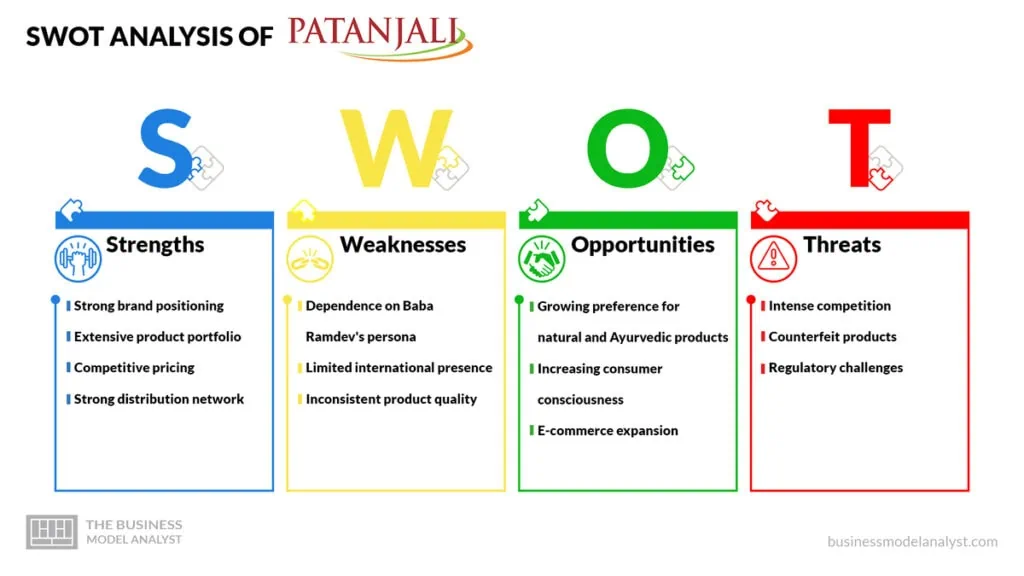
Patanjali Strengths
- Strong brand positioning: One of the key strengths of Patanjali is its strong brand positioning as a provider of natural Ayurvedic products. Baba Ramdev’s reputation as a yoga guru and the emphasis on naturopathy have significantly contributed to the trust consumers place in the brand;
- Extensive product portfolio: Patanjali offers a wide range of products across multiple categories such as food and beverages, personal care, healthcare, and home care. This extensive product portfolio has allowed Patanjali to cater to the diverse needs of its consumers;
- Competitive pricing: Another strength of Patanjali is its ability to offer products at competitive prices. By keeping the manufacturing process in-house and utilizing economies of scale, Patanjali is able to offer products at lower prices compared to competitors;
- Strong distribution network: Patanjali has established a robust distribution network comprising its own retail stores, as well as tie-ups with various retail chains and e-commerce platforms. This extensive distribution network has helped Patanjali expand its market reach and increase its sales.
Patanjali Weaknesses
- Dependence on Baba Ramdev’s persona: Patanjali’s strong association with Baba Ramdev’s persona is both a strength and a weakness. While it brings credibility to the brand, the over-dependence on the founder’s image poses a risk for the company. Any negative publicity or controversy surrounding Baba Ramdev may affect the brand’s perception;
- Limited international presence: Despite its significant growth within India, Patanjali has a limited international presence. Expanding into international markets requires overcoming regulatory challenges, building brand recognition, and adapting to different consumer preferences;
- Inconsistent product quality: Over the years, there have been occasional reports of inconsistent product quality from Patanjali. These instances can dent consumer trust and affect brand loyalty.
Patanjali Opportunities
- Growing preference for natural and Ayurvedic products: With the rising awareness about health and wellness, there is a growing demand for natural and Ayurvedic products. Patanjali is well-positioned to capitalize on this trend by expanding its product offerings in this segment;
- Increasing consumer consciousness: Consumers are becoming more conscious of their choices and opting for ethically produced, environmentally friendly products, and free from harmful chemicals. By emphasizing its natural and Ayurvedic ingredients, Patanjali can attract this growing segment of conscious consumers;
- E-commerce expansion: The growth of e-commerce provides Patanjali with an opportunity to increase its market reach and accessibility. By partnering with e-commerce platforms and leveraging technology, Patanjali can tap into the increasing online shopping trend.
Patanjali Threats
- Intense competition: The FMCG sector in India is highly competitive, with both national and international players vying for market share. Established brands with significant resources and marketing capabilities pose a threat to Patanjali’s growth;
- Counterfeit products: Counterfeit products bearing the Patanjali brand have been a concern. These products not only affect the brand’s reputation but also pose risks to consumer safety and trust;
- Regulatory challenges: As Patanjali expands into international markets, it will face regulatory challenges specific to each country, including product registrations, compliance with labeling and packaging regulations, and local certifications.
-> Read More About Patanjali’s SWOT Analysis
Conclusion
Patanjali’s business model has successfully challenged the dominance of multinational companies in the Indian consumer goods market. By leveraging its brand image, adopting a unique positioning strategy, and offering a wide range of naturopathic and Ayurvedic products, Patanjali has managed to win the trust and loyalty of Indian consumers. Moreover, the company’s direct distribution model and cost-effective pricing strategy have been instrumental in expanding its reach and capturing a significant market share.
Despite its rapid growth and success, Patanjali faces challenges maintaining its brand image and product quality as it scales. Competing with other established multinational companies, the company must continuously innovate and adapt to changing consumer preferences. Additionally, increasing consumer awareness and scrutiny surrounding the efficacy of Ayurvedic products necessitate strict quality control measures and adherence to regulatory standards.
Patanjali has revolutionized the Indian consumer goods market through its disruptive business model that leverages traditional practices and appeals to health-conscious and value-seeking Indian consumers. With its customer-centric approach, strong distribution network, and commitment to affordable and natural products, Patanjali is well-positioned to continue its remarkable growth journey in the years to come.

